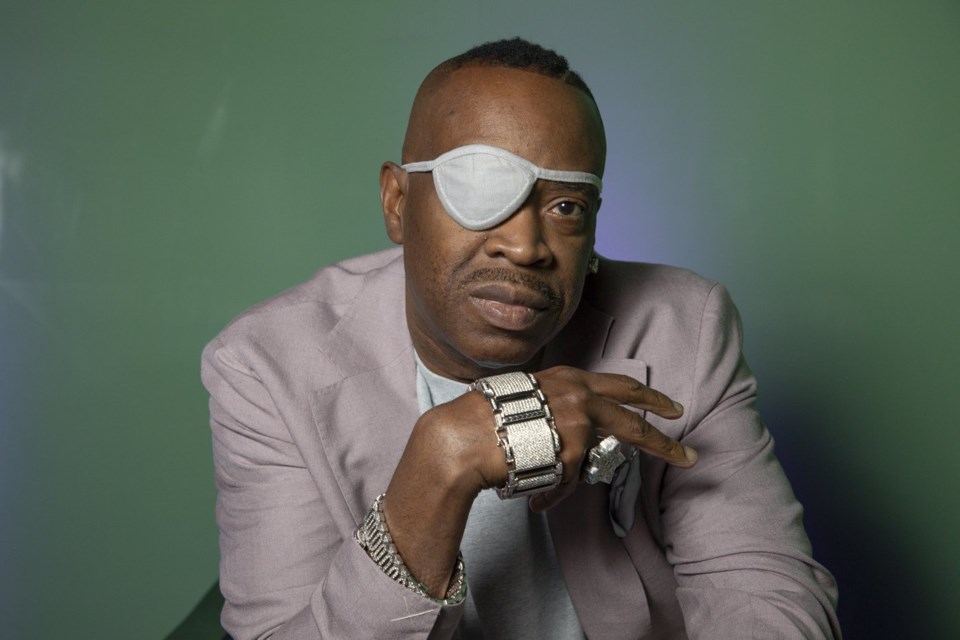LOS ANGELES (AP) — legend Slick Rick is proving his creative spark is far from fading.
The English-born rapper — known for his signature eye patch and masterful storytelling — returned to the booth with his first new project in nearly three decades. He's reminding the world of his timeless rap prowess on his visual album, “Victory,” released Friday.
It marks Slick Rick's first album since 1999's “The Art of Storytelling.” This new project is largely self-produced, with the rapper handling 95% of the production and sharing executive producer duties with Emmy-nominated actor and occasional rapper-DJ , who appears on the album alongside , Giggs and Estelle.
“You was a young adult, then a middled aged man and now you’re an older man, so my mentality has to grow with it,” said Slick Rick, known for his rap classics such as “Children's Story,” “La Di Da Di” with Doug E. Fresh and “Mona Lisa.” His debut album, “The Great Adventures of Slick Rick,” in 1988 hit No. 1 on the Billboard R&B/hip-hop charts.
“Victory” was four years in the making, with Slick Rick, now 60, writing and recording the album between his birthplace of London then France, while the visuals were filmed in the United States, United Kingdom and Africa.
Slick Rick believes his voice still resonates in hip-hop. He said the subjects he tackles have grown with him.
“Can’t always be children all the time,” he said. “We grow and talk about things that interest us at this age.”
In a recent interview, Slick Rick spoke with The Associated Press about how storytelling plays a role in today's rap, his relationship with Elba and how hip-hop has no limitations.
Remarks have been edited for clarity and brevity.
AP: How did you and Idris hook up?
SLICK RICK: We met at a party and then we clicked. His people reached out to me, and they wanted to make an album. They flew me to England and France. I hung out with Idris at his cribs, and we just did what we do. We just had fun, And then when we was finished, we said, “Yeah, we’re ready to bring it to the marketplace.”
AP: Did you ever feel hesitant stepping back into the spotlight, or did this album feel like destiny?
SLICK RICK: It might've been a little hesitation, but you’re just having fun. We just bringing it to the marketplace and see what happens. There’s no pressure or nothing. We're bringing it to the people to see if they like it. Feed them.
AP: When did you feel like this project was ready for public consumption?
SLICK RICK: When we were in the studio with Idris doing our thing, I checked the reactions of people. But then I saw people in their happy place. Once I saw that, I’m good. I see him and his people’s happy. A little dancing. Popped a little Moet. We were having a good time.
AP: You blended hip-hop melodies with various sounds including reggae and house music. What was your vision behind this musical approach?
SLICK RICK: It’s what Black people like. We’re not just hip-hop. We like reggae. We like house music. Let’s say like the Beatles or Barry Manilow. We go all over the place. Dionne Warwick, Diana Ross. We go places. We try to entertain ourselves in different areas of existence.
AP: What made you go the visual album route?
SLICK RICK: It was saving time. People make songs and do videos anyway. So why not just speed this up real quick? Video and rap both at the same time. Boom, let’s keep it moving. ... This is like watching a movie. You want to expand the picture. Not only do you hear my voice and the music, which is the essence. You get ... visual picture as well.
AP: You produced the bulk of the album. Why did you decide to go that route instead of enlisting other producers?
SLICK RICK: In my creative process, I need to have a lot of input or it’s not going to be authentic Rick. Too many hands, it’s not going to pop. So many hands is going to distort stuff. I do my own music most of the time.
AP: What’s the importance of rap storytelling in 2025?
SLICK RICK: It’s an open space. It hasn’t been filled, the whole storytelling thing. Before it gets too lost back into braggadocios, one frequency. Expand your horizons. You don’t always have to be rough. Be romantic. Be humorous. Be vulnerable. Go all over. Be a politician. Use your imagination. Go places, so we can take stories and give to our people's imagination.
Jonathan Landrum Jr., The Associated Press



